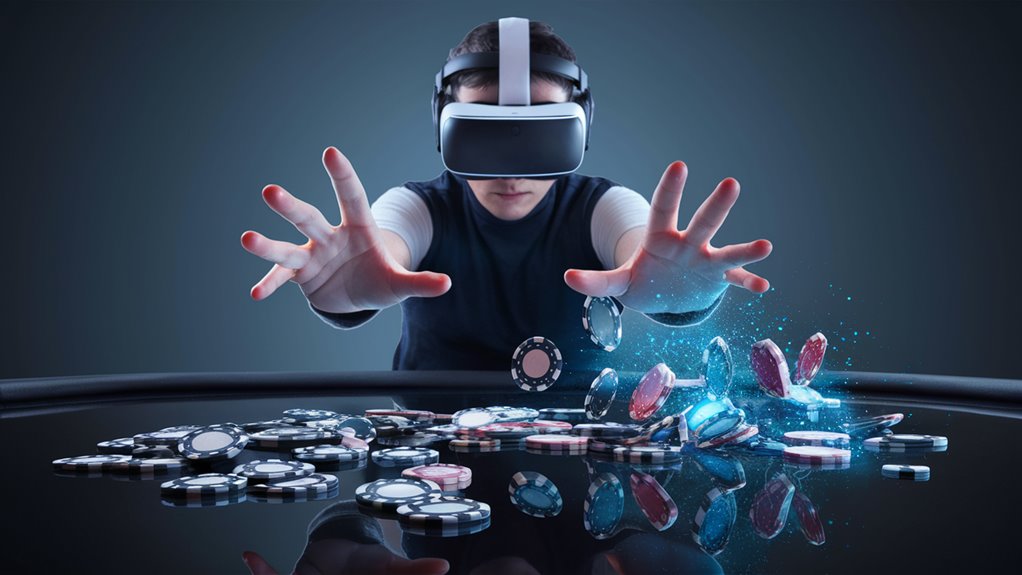
How Is Virtual Reality Revolutionizing Casino Gaming?
Key Takeaways
- VR casino technology creates immersive, photorealistic gaming environments
- Players can interact with dealers and other gamblers globally in real-time
- Virtual venues offer enhanced accessibility compared to traditional casinos
- The technology transforms classic games like slots and poker into interactive experiences
Virtual Reality casino gaming transforms traditional gambling by merging immersive 3D environments with real-time player interactions. When entering a VR casino, you’re transported into a photorealistic space where geographic limitations disappear, and gaming possibilities expand exponentially.
The Immersive Gaming Experience
Step into a VR casino, and you’ll immediately notice the difference from standard online platforms. Instead of clicking through basic interfaces, you’re physically present in a digital environment where you can:
- Move naturally through the casino floor
- Interact with dealers using hand gestures
- Watch other players’ reactions in real-time
- Experience games from multiple viewing angles
Social Interaction in Virtual Spaces
VR casinos bridge the gap between online and physical gambling by enabling:
- Real-time conversations with players worldwide
- Natural body language and facial expressions
- Group interactions at gaming tables
- Tournament participation in immersive environments
The Future of Casino Gaming
While VR casino technology continues evolving, it’s already reshaping digital gambling through:
- Enhanced game mechanics and interactions
- Improved accessibility for remote players
- Integration of traditional casino atmosphere
- Innovation in game design and features
The transformation of casino gaming through virtual reality represents more than just technological advancement? it’s creating an entirely new way to experience gambling entertainment, combining the convenience of online play with the immersion of physical casinos.
The Rise of VR Casinos
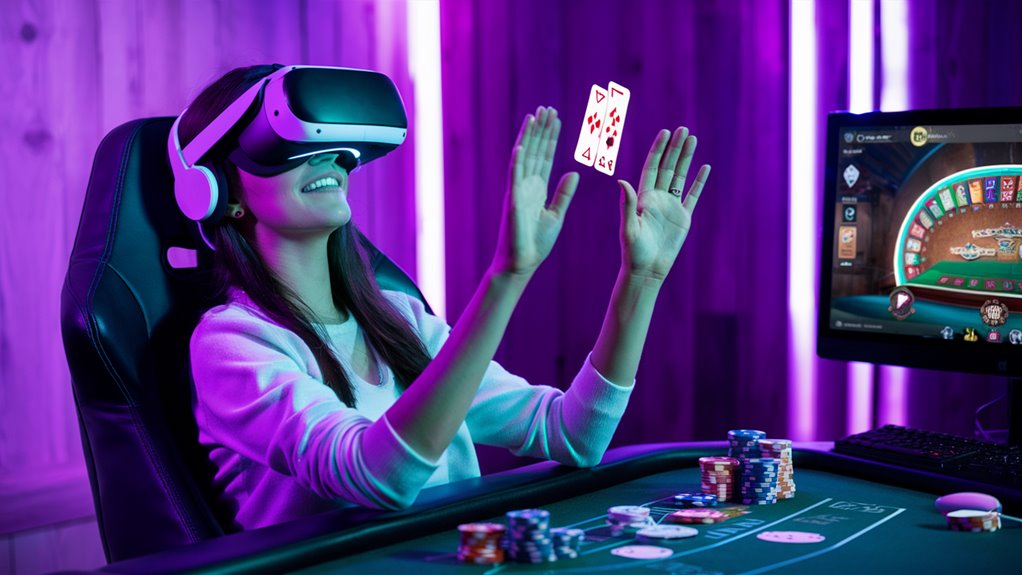
How Are VR Casinos Transforming Online Gambling?
Key Takeaways
- VR casino technology creates immersive gambling environments that replicate real casino experiences
- Players can interact with dealers and other gamblers in real-time through customizable avatars
- The VR casino market is projected to reach $1.7 billion by 2025
- Leading gaming developers are investing heavily in VR gambling platforms
The Immersive VR Casino Experience
Virtual Reality casinos represent the latest evolution in online gambling, merging traditional casino atmospheres with cutting-edge digital technology.
Players connect through VR headsets to enter photorealistic gaming environments where they can interact with opponents worldwide, read facial expressions, and engage in natural conversation.
Features and Functionality
VR casino platforms offer:
- Fully navigable casino floors
- Real-time dealer interactions
- Customizable player avatars
- Motion-controlled gameplay
- Social interaction features
- Virtual amenities (bars, lounges)
Popular Casino Games in VR
Players can access various casino classics in virtual reality:
- Poker tables with real-time opponent interactions
- Blackjack with gesture-based card handling
- Interactive slot machines
- Roulette with immersive betting experiences
Technical Innovation
Industry leaders like NetEnt and Microgaming have developed sophisticated VR gambling platforms that:
- Respond to physical movements
- Track hand gestures
- Deliver realistic card and chip handling
- Create authentic casino sound environments
Market Growth and Adoption
Since 2020, VR casinos have experienced significant growth:
- Major online casinos are integrating VR technology
- Tech-savvy players are driving increased demand
- Market projections indicate substantial expansion
- Investment in VR gambling infrastructure continues to grow
This emerging technology bridges the gap between traditional casinos and online platforms, offering an unprecedented level of immersion and social interaction in digital gambling environments.
Social Gaming in Virtual Worlds
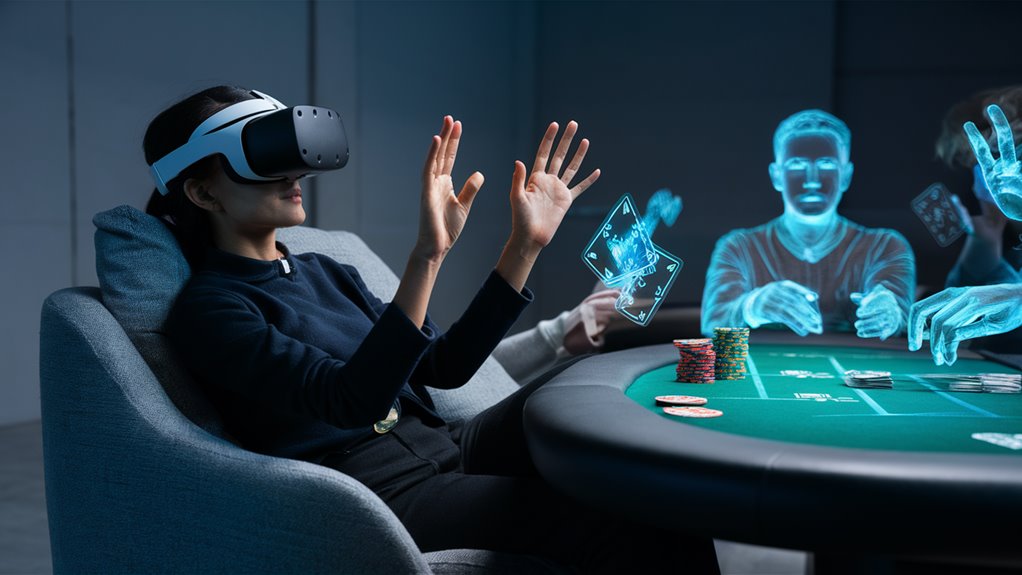
How Does Social Gaming Transform Virtual World Interactions?
Key Takeaways:
- Virtual worlds enable real-time social connections through customizable avatars
- Spatial audio and interactive features create authentic social experiences
- Non-monetary gaming options promote inclusive community building
- Social rewards systems drive engagement and friendly competition
Social gaming in virtual worlds revolutionizes online interactions by combining immersive technology with community-building features.
Players connect through customizable avatars in dynamic environments where they can chat, gesture, and express emotions naturally, creating an authentic social experience that traditional online platforms can’t replicate.
Global Community Spaces
Virtual social spaces function as gathering hubs where users from different corners of the world interact in lounges, entertainment zones, and community areas.
The integration of spatial audio technology and voice chat creates natural conversation flows, while private group formations and multiplayer activities foster deeper social connections.
Inclusive Gaming Features
Modern virtual worlds incorporate various gaming options that focus on social interaction rather than monetary transactions. Players can:
- Practice skills in risk-free environments
- Participate in casual group activities
- Join community events and tournaments
- Track progress through achievement systems
- Compete on social leaderboards
- 감정적 트리거 베팅에 미치는 영향
These social gaming elements transform virtual spaces from simple gaming venues into vibrant community centers where entertainment and social connection merge seamlessly.
The combination of interactive features, reward systems, and community-driven activities creates an engaging environment that keeps users returning for both gaming and social experiences.
VR Casino Game Development
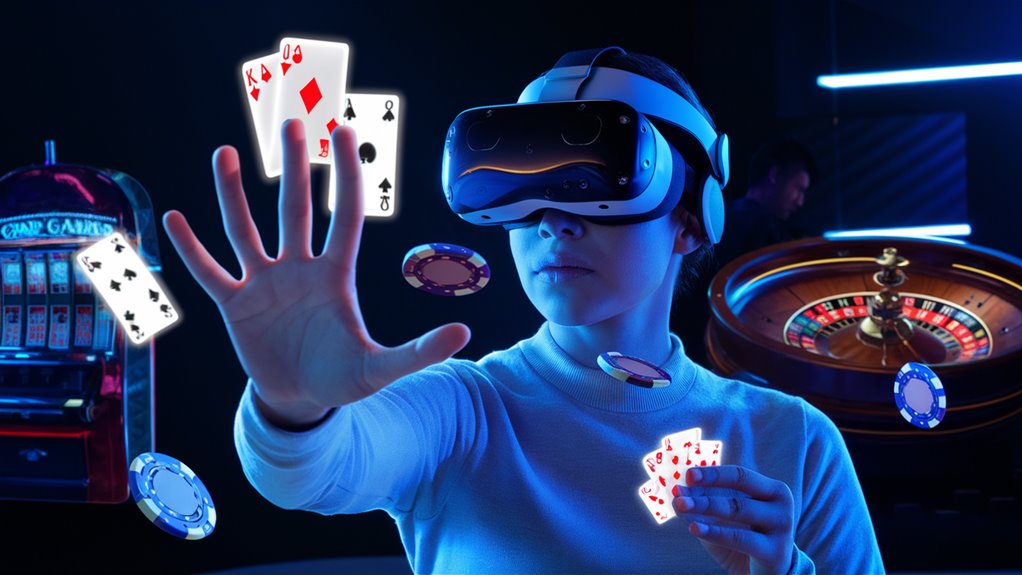
How Does Modern VR Casino Game Development Work?
Key Takeaways
- VR casino development combines advanced physics engines and 3D graphics for authentic gambling experiences
- Unity and Unreal Engine serve as primary development platforms for creating realistic casino environments
- Regulatory compliance and secure payment systems are essential for legal VR gambling operations
Core Technology Components
Modern VR casino development integrates cutting-edge hardware and software solutions to create immersive gambling environments.
Advanced physics engines power realistic chip handling and card movements, while high-fidelity 3D graphics render detailed casino atmospheres.
Haptic feedback systems enable players to feel physical sensations when interacting with virtual objects.
Essential Development Features
The creation of VR casino games requires several critical components:
- Spatial audio for directional sound effects
- Natural dealer animations and behaviors
- Precise hand tracking systems
- Realistic table physics
- Responsive card mechanics
Development Platforms and Tools
Unity and Unreal Engine stand out as the leading development platforms for VR casino games, offering:
- Built-in physics simulation tools
- Advanced graphics rendering capabilities
- Robust networking frameworks
- Multi-platform deployment options
Technical Requirements and Compliance
Successful VR casino development demands:
- Certified random number generation (RNG) systems
- Fair play algorithms and testing
- Secure payment processing integration
- Regulatory compliance monitoring
- Real-time multiplayer networking
- Data encryption protocols
These elements work together to deliver a secure, fair, and engaging virtual gambling experience while meeting all legal requirements and industry standards.
Player Safety and Responsible Gaming
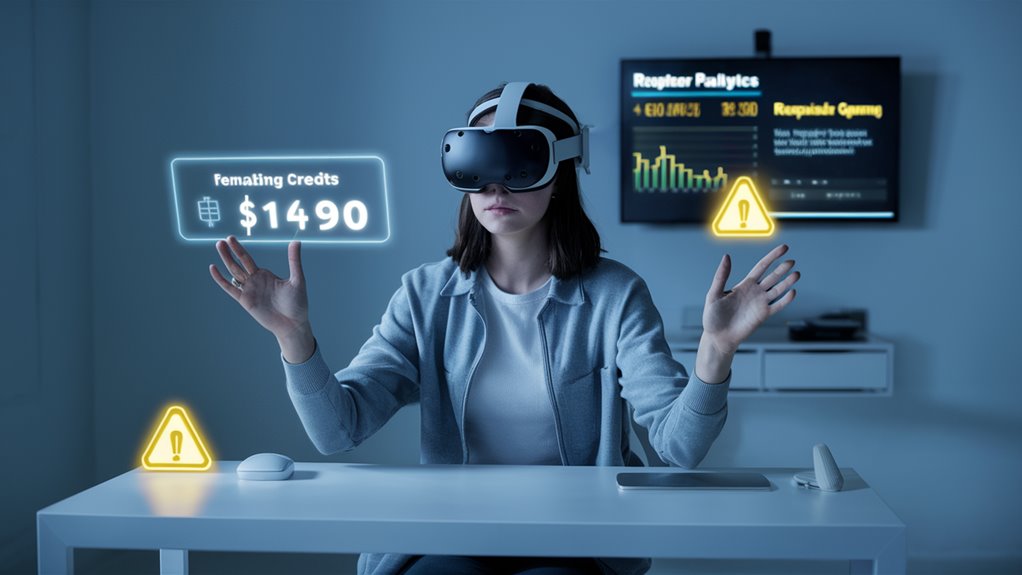
How Can Virtual Reality Casinos Keep Players Safe and Promote Responsible Gaming?
Key Takeaways
- VR casinos implement time-tracking and mandatory break systems
- Built-in safety features protect against motion sickness and physical hazards
- Responsible gaming tools include spending limits and self-exclusion options
- Automated systems monitor and respond to problematic gambling behavior
Time Management and Reality Checks
Virtual reality gambling environments utilize advanced time-tracking systems that monitor session duration and enforce scheduled breaks.
Reality check features periodically interrupt the immersive experience to display current gambling statistics, helping players maintain awareness of their wins and losses.
Physical Safety Measures
Modern VR casino platforms incorporate multiple safety features:
- Comfort ratings to assess motion sickness risk
- Customizable movement controls
- Real-world space hazard warnings
- Head movement monitoring
- Physical response tracking to prevent disorientation
Responsible Gaming Tools
Players can access several protective features:
- Customizable spending limits locked during active sessions
- One-click self-exclusion options
- Direct access to gambling addiction resources
- Automated behavior monitoring systems
- Intervention triggers for concerning betting patterns
These responsible gaming measures create a comprehensive safety net for VR casino users, combining technological innovation with proven responsible gambling practices.
The integration of physical and financial protection features helps maintain a secure gaming environment while supporting player well-being.
Virtual Payment Systems
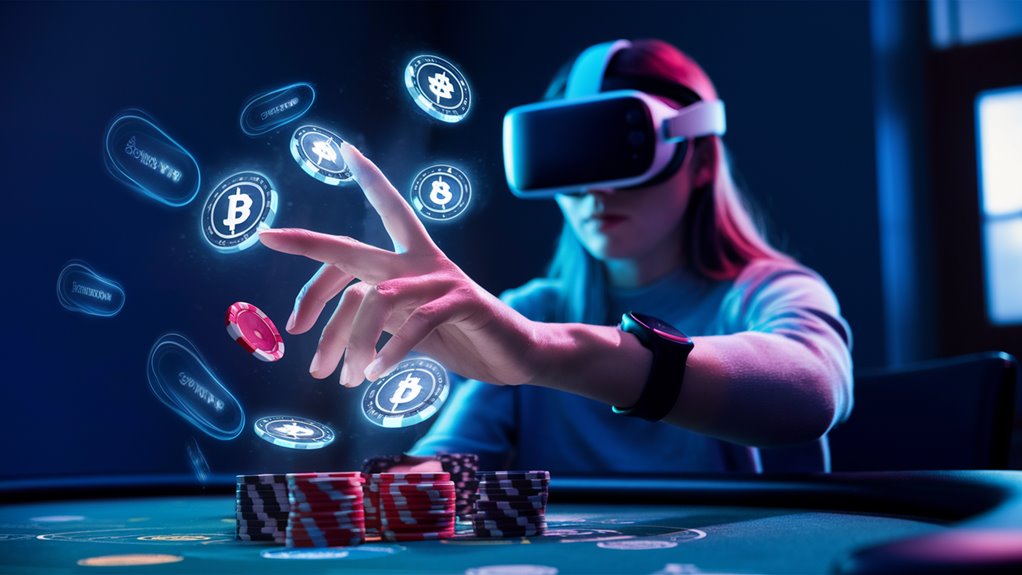
How Do Virtual Payment Systems Work in Digital Environments?
Key Takeaways
- Virtual payment systems combine traditional banking with digital solutions
- Real-time transaction processing within immersive environments
- Multi-layer security features protect user financial data
- Various payment options from credit cards to cryptocurrencies
Understanding Virtual Payment Integration
Today’s digital platforms integrate multiple payment systems, merging conventional banking methods with modern digital solutions.
Traditional options like credit cards and bank transfers work seamlessly alongside cryptocurrency wallets, e-wallets, and digital payment services.
The integration happens directly within the digital interface, enabling smooth fund management without disrupting the user experience.
Real-Time Transaction Management
Users can access their digital wallets through virtual displays or voice commands while staying immersed in the digital environment.
Advanced security protocols encrypt every transaction, safeguarding financial data during deposits and withdrawals.
The system delivers instant balance updates and transaction confirmations through unobtrusive virtual notifications.
Modern Payment Options and Safety Features
Digital platforms now commonly support cryptocurrency transactions, including Bitcoin and Ethereum payments.
Users can implement automated spending limits and cooling-off periods for responsible financial management.
The addition of biometric authentication strengthens security by requiring unique physical identifiers for transaction authorization in the virtual space.
Security Measures and User Protection
- Advanced encryption protocols
- Real-time transaction monitoring
- Biometric authentication systems
- Automated spending controls
- Instant notification systems
Hardware and Technology Requirements
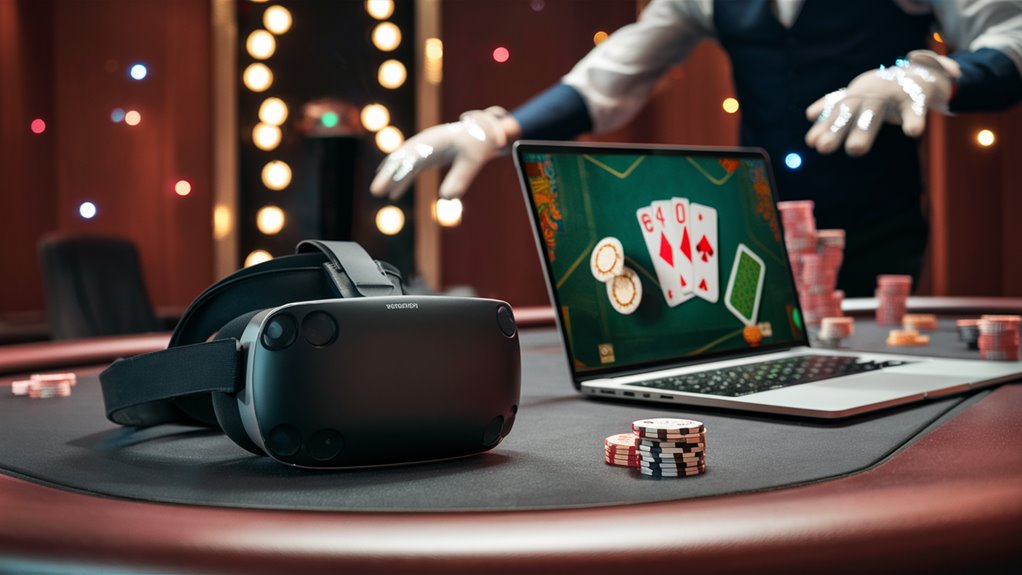
What Hardware Do You Need for VR Casino Gaming?
Key Takeaways
- A VR headset (Meta Quest 2, Valve Index, or HP Reverb G2) with motion controllers is essential
- Minimum PC specs: NVIDIA GTX 1060/AMD RX 480, 8GB RAM, Intel i5 processor
- Stable internet connection: 20Mbps download, 5Mbps upload
- Dedicated play space: 6.5 x 6.5 feet minimum
Essential VR Hardware Requirements
VR casino gaming requires specific equipment to create an immersive experience.
The foundation starts with a quality VR headset like the Meta Quest 2, Valve Index, or HP Reverb G2, paired with motion-tracking controllers.
Think of these as your gateway to the virtual casino floor – they’re what transforms your movements into in-game actions.
Computer Specifications
Your gaming PC needs enough power to handle VR environments smoothly:
- Graphics: NVIDIA GTX 1060 or AMD Radeon RX 480 (minimum)
- Memory: 8GB RAM
- Processor: Intel i5 or equivalent
- Operating System: Windows 10 or later
Internet and Space Requirements
A reliable internet connection ensures you won’t miss a beat at the virtual tables:
- Download speed: 20Mbps minimum
- Upload speed: 5Mbps minimum
- Play space: Clear area of 6.5 x 6.5 feet
Optional Enhancement Accessories
Several peripherals can elevate your VR casino experience:
- Haptic gloves for realistic chip and card handling
- Spatial audio headphones for authentic casino ambiance
- Enhanced VR facial interfaces for extended gaming comfort
Remember to measure your available space and verify your internet speeds before investing in VR casino gaming equipment.
Starting with the basic requirements ensures a smooth entry into virtual casino gaming, while additional accessories can be added later to enhance your experience.
Market Growth and Future Prospects
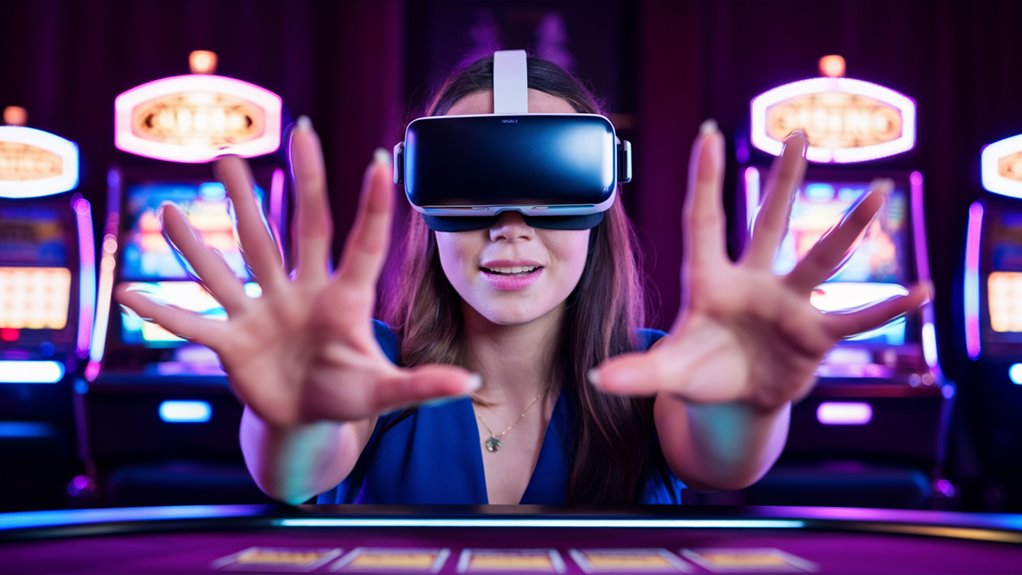
How Is the VR Casino Market Growing and What’s Next?
Key Takeaways
- VR casino market projected to grow at 21.7% CAGR from 2023-2027
- Major expansion in Asia and Latin America due to improved infrastructure
- Integration of blockchain, AI, and cross-platform compatibility driving innovation
Current Market Growth
The virtual reality casino market is experiencing rapid expansion, with analysts forecasting a 21.7% compound annual growth rate between 2023 and 2027.
Major casino operators are strategically investing in VR technology to capture younger demographics through immersive gaming experiences.
Technology Integration
Modern VR casinos are evolving beyond basic gameplay by incorporating:
- Multiplayer interaction capabilities
- Real-time dealer communication systems
- Enhanced social gaming features
- VR sports betting platforms
- Hybrid gaming experiences
Emerging Markets
Regional growth is particularly strong in:
- Asia: Expanding internet infrastructure
- Latin America: Decreasing hardware costs
- Developing economies: Increased technology accessibility
Future Developments
The VR casino industry is poised for technological advancement through:
- Blockchain integration for secure transactions
- AI-powered personalization features
- Cross-platform compatibility
- Regulatory adaptation in new jurisdictions
This market evolution combines traditional casino elements with advanced gaming mechanics, creating new opportunities for operators and enhanced experiences for users.
As regulatory frameworks adapt to accommodate VR gaming innovations, the market is expected to continue its upward trajectory.
